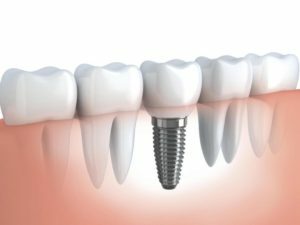 Implantation of teeth is a modern method for solving many dental problems. However, he has a lot of contraindications, so it is not possible to conduct surgical intervention in every situation.
Implantation of teeth is a modern method for solving many dental problems. However, he has a lot of contraindications, so it is not possible to conduct surgical intervention in every situation.
In addition, many people still do not dare to take this step because of the risk of complications.
Contents
- Contraindications and possible limitations
- point can not be restricted Limitations with
- solution Possible complications immediately after implantation
- Complications at the implantation stage
- Per step before
solution Contraindications and possible limitations
Implantation of the tooth is a serious step to which it is necessary to prepare. This is due to the fact that there are many limitations. And if you do not take them into account, then you can cause serious harm to the body.
Dentists, having huge experience behind their shoulders, are able to give efficient advice and plan optimal treatment even in the presence of some undesirable circumstances. The main thing - patience and readiness to follow the doctor's recommendations.
The point
can not be used. Absolute contraindications are singled out, in which the implantation will have to be abandoned completely:
- Problems with the circulatory system , in particular , a violation of blood coagulation, is not allowed to perform the implant surgery because of the risk of severe bleeding.
- Malignant-type tumors are an absolute limitation, as external influences can trigger the growth of metastases.
- Neurological disorders , both congenital and acquired, can affect the course of treatment, as patients sometimes inadequately respond to the required procedures, which affects the implantation process.
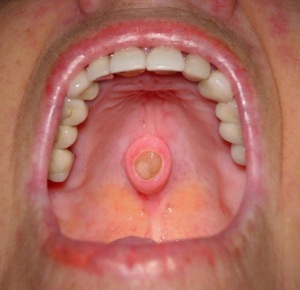
- Immunodeficiency is a contraindication for treatment, as the process of installing a tooth implant requires time and active work of internal systems. If the body is deprived of protective functions, healing will progress very slowly and with complications.
- Connective tissue diseases interfere with the positive course of treatment. After surgical intervention, active cell growth and tissue formation around the implant of the teeth is required, and chronic problems will prevent healing.
- Diseases of the oral mucosa , such as aphthous stomatitis, lupus erythematosus, Sjogren's syndrome, are an absolute contraindication because of the prohibition of surgical intervention. Diabetes mellitus type I .
- Tuberculosis .
- Bruxism and hypertonicity of the masticatory muscles .
Limitations with
Solution Along with absolute limitations, relative contra-indications are distinguished. Treatment with implants is allowed after the following factors have been eliminated:
- no sanation of the oral cavity;
- improper hygiene of the oral cavity;
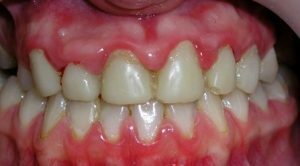
- is an incorrect bite, which is recognized by the orthodontist as a pathological form;
- arthrosoarthritis;
- periodontitis;
- gingivitis;
- defect or atrophy of bone tissue of the alveolar process;
- pregnancy;
- bad habits in the form of alcoholism, smoking, drug addiction.
There is also a different classification of contraindications, related to sources of restrictions, according to which they can have a general or local character.
General contraindications include:
-
 intolerance of anesthetics;
intolerance of anesthetics; - prohibition of surgical intervention;
- general diseases;
- treatment with drugs that affect implant implantation, such as antidepressants or anticoagulants;
- diseases of the central nervous system;
- prolonged and severe stress;
- is a cachexia.
Possible complications immediately after implantation
After performing a surgical procedure, the body often responds to the appearance of a foreign body inside the jaw. There are various side effects that, depending on the individual characteristics, may not appear at all or arise in a complex. Most often it is:
- Pain .Avoid pain after implantation will not work, discomfort will arise immediately after the anesthesia is over. The operation seriously affects the tissue, so it is normal to feel the pain syndrome within three days. In the course of treatment,
 is prescribed painkillers that will help reduce discomfort, but if the problem persists and after three days, it is worth complaining to her dentist, as the cause may be damage to the nerve.
is prescribed painkillers that will help reduce discomfort, but if the problem persists and after three days, it is worth complaining to her dentist, as the cause may be damage to the nerve. - Edema .The most common reaction is swelling. This is a completely natural process, which is caused by a violation of the integrity of the tissue. Tumescence may localize in the area of the implanted implant or on the cheek. Edema occurs a couple of hours after the operation and can last up to seven days. If after a week the swelling has not slept, it is necessary to contact the treating dentist, as this may indicate the development of the inflammatory process. How to relieve swelling? It is recommended to apply cold compresses to the cheek. As a rule, with the installation of a single tooth implant this side effect is not observed.
- Temperature of .Elevated temperature indicates the activation of the immune system. This is the usual reaction after surgery of any scale. It is important that it does not increase significantly, to 38 - an acceptable rate, and did not last longer than three days. Otherwise, it is necessary to undergo examination, since fever may be a sign of mucosal inflammation.
- Bleeding of in the first few days is allowed, especially if the patient is taking medications that affect blood clotting, for example, the popular Aspirin. Ten days later, the area of tissue damage should be prolonged, bleeding after this period may indicate damage to the vessels during surgery. Excessive profuse bleeding in the early days should also alert, since with adequate surgical intervention only tissue that can not bleed heavily is damaged.
- Divergence of sutures is rare, as implantologists use strong threads during the operation. But, sometimes in the inflammatory process or mechanical damage, they can disperse, which should immediately be reported to the treating doctor. This will help in time to take measures and to protect themselves from getting into the tissue of pathogens.
- Another side effect is numbness of the lower jaw of .Five hours after implantation is a normal reaction, as the body only departs from anesthesia, but lack of sensitivity for a long time can indicate a nerve damage, the restoration of which will last no one month.
The process of installing dental implants:
Complications at the implantation stage of the
implant After a successful operation, it is still too early to relax, since serious complications can occur during the engrafting phase. Among them are:
- Reimplantitis is an inflammatory process that encompasses the near-implant bone tissue. It can be caused by a hemorrhage over the plug, damage to the walls of the paranasal sinus, errors during the operation, inflammation in closely located teeth,
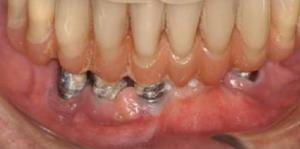 inaccurately made crown, improper hygiene. The disease develops on the basis of infection, which is localized in bone tissue. If you do not take measures at the initial stage, the reimplant will pass into a chronic form, cause deformation of the bone. The implant will become mobile, as a result of which it will be necessary to remove it and direct the forces to the treatment of the socket. It is worth noting that this complication is rare, in about 2% of cases, and, as a rule, it is effectively treated already at the initial stage.
inaccurately made crown, improper hygiene. The disease develops on the basis of infection, which is localized in bone tissue. If you do not take measures at the initial stage, the reimplant will pass into a chronic form, cause deformation of the bone. The implant will become mobile, as a result of which it will be necessary to remove it and direct the forces to the treatment of the socket. It is worth noting that this complication is rare, in about 2% of cases, and, as a rule, it is effectively treated already at the initial stage. - Excision of a tooth implant .This is the rejection of the titanium core bone tissue. This problem is encountered by no more than 1% of patients. Reasons for rejection may be an allergic reaction, reimplant, lack of bone tissue, exacerbation of chronic diseases, smoking after surgery. This complication is characterized by the following symptoms: pain in implant implantation, as well as its mobility. As soon as the dentist identifies rejection, the stem will be removed from the bone tissue, the patient will need to undergo a course of therapy for healing the wound and enriching the bone tissue with minerals. After that, you can re-go to implantation after a couple of months.
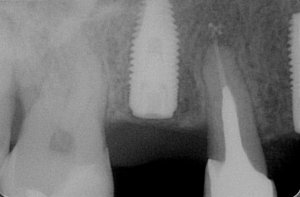
- Pushing an implant or twisting its element is due to insufficiently rapid bone regeneration. Most often it is put in place and a course is prescribed, which activates the mineralization of bone tissue. If the implant does not survive after the treatment, it is removed completely and another method of prosthetics is used.
- The formation of bone tissue over the implant element is not as such a complication. This process is not dangerous for implantation of the prosthesis, but it requires cutting the mucosa and removing the bone build-up to make sure that nothing hinders the screwing element.
One step before the decision of
 Before selecting a clinic and a treating implantologist, it is necessary to familiarize yourself with the patient's opinions and weigh the pros and cons. The success of the operation and the implantation rate depend on the experience of the dentist.
Before selecting a clinic and a treating implantologist, it is necessary to familiarize yourself with the patient's opinions and weigh the pros and cons. The success of the operation and the implantation rate depend on the experience of the dentist.
As a rule, primary complications can not be avoided, but these are temporary inconveniences and the main thing is that the implant should take root in the bone tissue and serve for a long time.
"I decided for a long time on tooth implantation, as I heard a lot of conflicting reviews. For a long time I studied the information on all dental clinics, and, finally, I can boast of a new tooth, which you can not distinguish from your own relatives. The operation went well, but after it had to endure slight difficulties. Two days the temperature was kept at 37.7, a terrible weakness. They inserted a six on top, a little swollen the right cheek, but after a couple of days the swelling began to subside. In general, the recovery process went smoothly, the implantation was easy. Thank you doctor! "
Marina, Moscow
" Implantation of two teeth has passed relatively smoothly. A lot of nuances had to be considered in preparation for the operation, I was taking a course of vitamin therapy, since I tend to frequent colds. Additional support for immunity with vitamins accompanied the entire course of treatment until complete engraftment of the teeth. In general, there is little about the operation, which can be said, since anesthesia operated, but after the pain was palpable. Pleasant little, but the result deserves. Before full implantation I often visited the dentist, but there were no complications. "
Stepan, Sochi
"If I knew that such a long process of inserting implants, I would hardly have agreed to them. At first everything was fine, no contraindications were found. The operation was successful, but after anesthesia, severe pain was felt, bleeding of the gums was observed, and there was a high fever. Over time, everything seemed to go well, but for some reason the tooth did not get accustomed, began to stagger a little. The dentist has appointed a course of treatment, installed the implant back. Right now everything is working fine, but I visit the doctor regularly. "
Oksana, Penza
